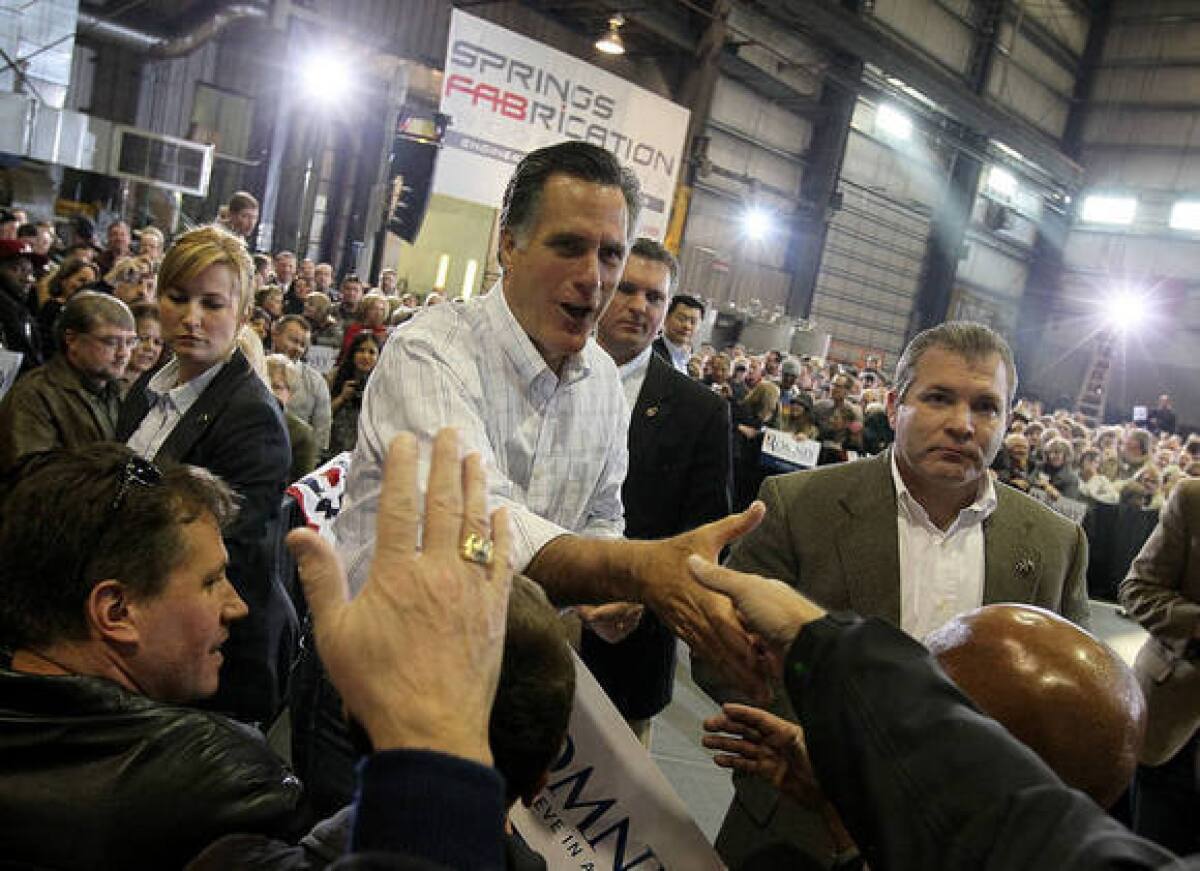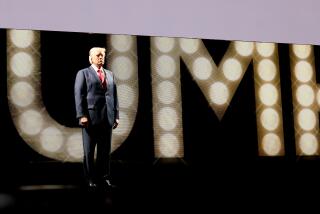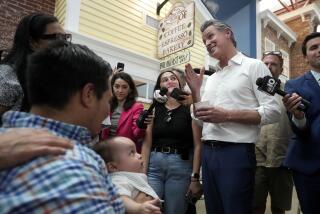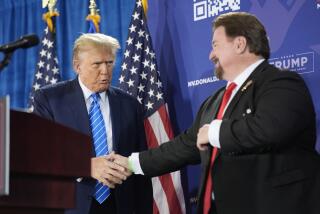Mitt Romney cruises to victory in Nevada caucuses

Mitt Romney romped to a commanding victory Saturday in Nevada’s Republican presidential caucuses, posting a second consecutive win and laying an impressive marker in a battleground state both parties will vigorously contest in November.
The strong showing, on top of Romney’s landslide win Tuesday in Florida, boosted his delegate count and enhanced his standing as the overwhelming frontrunner in the fight for the GOP nomination.
Trailing far behind were former House Speaker Newt Gingrich and Rep. Ron Paul of Texas, who were vying for second place. Former Pennsylvania Sen. Rick Santorum, who eked out a win in Iowa but has faded since, was a distant fourth.
It takes 1,144 delegates to win the nomination and Romney has staked an early lead in that count. But more meaningful was the momentum he gains from strong back-to-back showings, which will carry him forward to the next round of balloting Tuesday in Minnesota, Colorado and Missouri.
Romney, who won Nevada overwhelmingly four years ago, enjoyed several advantages on top of his Florida momentum. More than a quarter of the GOP electorate Saturday was Mormon and more than 9 in 10 of that group voted for Romney, who shares their faith.
But Romney’s strong performance was built on more than religious affinity; he garnered broad support across most of the GOP, as he did in Florida and New Hampshire, the other state he won.
Entrance polls showed him carrying just about every category of caucusgoer Saturday, save the youngest, the secular and those making the least money, who preferred Paul.
Nevada saw a truncated campaign that disappointed many here who anticipated the state’s turn on the national stage and a chance to introduce Nevada’s woes and Western issues, like water and land use, into the presidential discussion.
Although Nevada has the nation’s highest unemployment rate, 12.6%, and leads the country in foreclosures, the candidates never discussed the housing collapse in any detail.
The one debate here took place back in October, when businessman Herman Cain was a front-runner and Gingrich, in the role of peacemaker, stepped up to defend Romney from other candidates’ attacks.
There were a few only-in-Nevada moments; Paul’s hotbed of support in the state’s legal brothels was widely noted. But there was little else to distinguish the contest from those that preceeded. (Blink and you would have missed Donald Trump‘s endorsement of Romney on Thursday at the former’s glittering Las Vegas hotel.)
In part, that resulted from Nevada’s being pushed back from fourth on the campaign calendar to fifth, after Florida elbowed its way ahead and staged its mega-primary on Tuesday. But it also reflected the state of the race, with the front-running Romney largely gliding above the competition and declining to engage his opponents in the kind of raucous debate that marked the contests in South Carolina and Florida.
Instead, he spent most of his time focusing on President Obama, laying the groundwork for what promises to be a hard-fought campaign between the parties for Nevada in the fall.
Gingrich continued to hammer at Romney, seizing on a comment he made Wednesday -- “I’m not concerned about the very poor” -- to open a new front in efforts to paint the former governor as the ideological twin of Obama. Romney said later he misspoke. But both, Gingrich said, are over-reliant on government programs to lift the poor, rather than creating opportunity.
But Gingrich was late setting up his Nevada campaign and suffered from unfortunate timing: Registration for the caucuses was cut off Jan. 20, the day before the big South Carolina win that resuscitated his campaign and positioned Gingrich as the main rival to Romney.
Compounding his problems were a series of snafus -- at one point he stood up Republican Gov. Brian Sandoval, who stayed neutral in the contest. That further undermined Gingrich’s efforts in the state.
Nevada held out more promise to Paul, who waged a vigorous campaign after walking away from Florida. The congressman finished second in the 2008 caucuses and boasted a loyal core of supporter in the tea party movement, a significant power in Nevada politics, attracted by his anti-tax, limited-government platform.
But here, as elsewhere, Paul suffered from a perception that a vote for him amounted to little more than a protest or a pointless statement, given the extremely long odds against his winning the nomination.
Paul had already moved on Saturday, campaigning in Minnesota, which holds its caucuses on Tuesday. In a CNN interview, he ruled out any chance of quitting before Super Tuesday on March 6, when nearly a dozen state vote. “I think we’re doing so well, there’s no reason to even think about that,” Paul said.
The cash-poor Santorum also stumped a bit in Nevada, but his main focus appeared to be Missouri, which holds a nonbinding primary Tuesday. Gingrich failed to qualify for the ballot there, and Santorum hopes a strong showing will bolster his claim to be the anti-Romney alternative.
Republicans will lose if they simply nominate the candidate with the most money, or the most moderate record, Santorum told supporters at a campaign stop Saturday night in Greeley, Colo. “We will win ... if we have someone who goes out and paints bold contrasts,” he said.
With Romney’s enormous advantages in money, momentum and organization -- he never really quit campaigning after winning the caucuses in 2008 -- the outcome in Nevada never seemed in doubt, which took much of the edge off the brief campaign.
So, too, did the time difference.
In keeping with their libertarian instincts, Republicans allowed each of the state’s 17 counties to set their own caucus rules. That resulted in different start and finish times at 125 caucus sites and a staggered release of vote totals.
In addition, a special after-dark caucus was held for those observing the Sabbath, which further delayed announcement of the final results. Local Republicans said the accomodation was made for a single individual, Sheldon Adelson, the billionaire casino mogul and a major Republican Party donor, but he insisted he had asked for no special treatment.
Regardless, the lateness of the hour meant the results came long after interest lapsed for many, especially on the East Coast. That meant a smaller audience for the candidates’ televised speeches and many headlines in Sunday newspapers that hedged the outcome.
More to Read
Sign up for Essential California
The most important California stories and recommendations in your inbox every morning.
You may occasionally receive promotional content from the Los Angeles Times.











